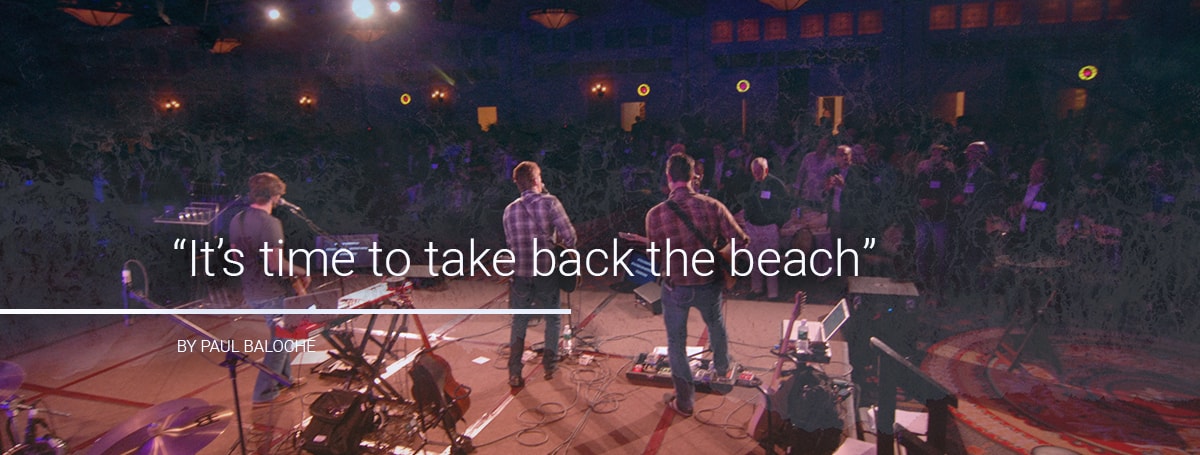
I had been in Holland and decided to take some time off at the end of the conference. My wife and I headed south and watched as the flat countryside of Belgium and northern France passed us by. We were on our way down to be with friends and hang out among the pavement cafes and immaculate beaches of Nice. But first there was something we needed to do. We needed to head west and visit the beaches of Normandy.
There among the plaques and the memorials, the desolate beaches and windswept lookouts it was impossible not to think about the soldiers who fought in World War II. So many bands of brothers who pulled together for the sake of freedom. So many who never came home. Nice seemed a long, long way from Normandy.
It got me thinking about worship. It got me thinking that just as Normandy and Nice somehow manage to fit within the same country, there’s a range of ways that we worship. Sometimes there is smoke and there are lights, seas of faces and merch tables at the back that we file past on our way back to the car and the long drive home. Those Friday night worship concerts are good times, and I’m for them, but they’re not what we need on a Sunday. Sunday is something different altogether. Sunday is the time for the un-concert.
Even though I live in Texas, I’m used to spending time in small churches. Ninety- nine per cent of the people I meet come from churches with 300 people or fewer in them. Yet even though they might not have many resources, some of them still feel that when Sunday morning comes around they need to try to emulate the Friday night worship concert.
Really? Do we really need to do that, to try and compete with or copy the concert?
The way I see it, those Friday night worship concerts are great and they’re to be enjoyed, but Sunday mornings are different. Sunday mornings should feel like a giant Bible study blended in with a family meal. Church worship leaders shouldn’t be under pressure to make some kind of big, Vegas production with smoke and ourselves a little more like an uncle of a big Italian family, or the matriarch calling everyone to the table. Our job is to gather and serve, not entertain.
We’re pastors first, not musicians. We’re here for one job – to help people connect with God.
But even though we use music and visuals in so many different ways to help that happen, what matters most is not how loud we set the PA or how dim we make the lights on a Sunday morning. To help people connect with God we have to care as much about the six days that lead up to the weekly worship slot as we do the twenty minute slot between the notices and the preach.
In my mind so much of it starts with the Psalms. They’re the vocabulary of worship, and you can’t do much better than to get them off the page and into your heart. Take time to be in your church building if you can, alone, praying as you worship. Look out at those empty seats, imagine the people that will fill them; the couple that usually sit at the front, the family that go at the side, the handful of teenagers that always sit at the back. Picture them, pray for them, get them in your heart pastorally.
The goal of the Sunday worship leader is not getting through our four songs without any musical trainwrecks. The goal is that when we look out across the microphone we don’t just see the church, but a collection of people who we’ve been praying for all week.
Of course, we don’t tell them that we’re doing it, but we do it all the same. And while it might even seem a little artificial at first, in time we get to the same kind of place that Jesus was when He looked over Jerusalem and wept. We can’t make ourselves weep, but we can humble our hearts and ask God for empathy, to have our hearts broken with the things that break His. When you’re in a place like that what is there to worry about if we sing off key or mess up when we do a certain modulation?
When we approach worship leading like this, we’ll want to remove the invisible barrier that often seems to separate the band from the congregation. If we’ve been praying over those empty seats during the week, then when we see them filled with the people who have been on our hearts, how can it not feel like family?
I guess this is stuff that I’ve become aware of over the years. I’m an average musician, good enough I suppose, but I haven’t got the vocal range or the charisma that Israel Houghton, Phil Wickham or Martin Smith have. And the people in my church are mainly missionaries doing amazing things that nobody has ever heard of. Big deal if I write a couple of songs or do albums. It’s a good check for me.
So from the beginning I’ve tried to stick to writing songs that are simple prayers that our church can sing. So I take what I hear in our pastor’s sermons or maybe some of our prayer meetings and try to write a simple chorus or song that reinforces where we are as a church. Open The Eyes Of My Heart didn’t come when I tried to write a cool song. It was a phrase that we had been praying during our worship and prayer nights. We’d been asking for God to send power and help us see Him in action. It’s the family thing again – the idea that we’re all traveling along this journey together, as a community. Our job is to serve and help others worship.
There’s one final thing that seeing worship like this does for us. It helps us guard against being quick critics. It’s not our job to be the worship police and decide what is and what is not of God. I’ve come to find that if we’re honest with ourselves we often have dressed our own preferences up in God-type language. We have said that the Lord likes this… or the Lord doesn’t like that…. I’m really not so sure God cares all that much about the musical style of our worship. But I’m convinced that He cares about the hearts of those that are making it.
Back in France on those Normandy beaches I was thinking about the way that soldiers united to fight. All those different backgrounds – race, religion, geography – so many things that could have separated them, but instead they were united by a common goal. They were there to take back the beaches, to lay their lives down in service of the greater good.
Could we do that too? If we saw ourselves as servants united by a common purpose, not divided by style or separated by the stage. couldn’t God use us to accomplish so much more than we ever dreamed possible?
